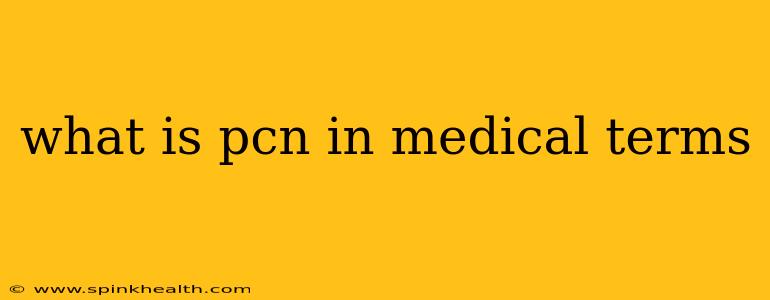What is PCN in Medical Terms? Unraveling the Mystery of Penicillin
The medical abbreviation PCN stands for penicillin. It's not just one single drug, but rather a family of antibiotics derived from the Penicillium mold. This discovery, a pivotal moment in medical history, revolutionized the treatment of bacterial infections, dramatically reducing deaths from previously deadly diseases. But what makes penicillin so effective, and what are its various forms? Let's dive in.
What are the different types of penicillin?
Penicillin isn't a one-size-fits-all solution. Its effectiveness varies depending on the type of bacteria causing the infection. Different types of penicillin have been developed, each with its own strengths and weaknesses regarding which bacteria it targets and how it's administered. These include:
-
Penicillin G: This is a classic form, often administered intravenously (IV) or intramuscularly (IM) for serious infections. It's highly effective against many bacteria but can be broken down by stomach acid, limiting its oral use.
-
Penicillin V: A more stable form than Penicillin G, this version can be taken orally. It's useful for treating less severe infections.
-
Amoxicillin: A semi-synthetic penicillin, meaning it's a modified version of naturally occurring penicillin. This broad-spectrum antibiotic treats a wider range of infections and is well-absorbed orally.
-
Ampicillin: Another semi-synthetic penicillin, ampicillin is also broad-spectrum and is often used to treat infections that don't respond to penicillin V.
-
Methicillin: This penicillin was developed to combat penicillinase-producing bacteria (bacteria that produce an enzyme to break down penicillin). However, many bacteria have developed resistance to methicillin, leading to the rise of MRSA (methicillin-resistant Staphylococcus aureus).
-
Others: Numerous other penicillin derivatives exist, each tailored to specific bacterial types and treatment needs.
How does penicillin work?
Penicillin and its derivatives work by interfering with the bacteria's ability to build their cell walls. Bacteria rely on strong cell walls for structure and protection. By inhibiting the enzymes responsible for cell wall synthesis, penicillin weakens the bacterial cell wall, leading to cell lysis (rupture) and bacterial death. This targeted mechanism of action makes it relatively safe for human cells, which don't have the same cell wall structure.
What are the side effects of penicillin?
While generally safe, penicillin can cause side effects in some individuals. These can range from mild, such as nausea, diarrhea, or rash, to more serious reactions, including anaphylaxis (a life-threatening allergic reaction). A history of penicillin allergy is a crucial piece of information for healthcare providers to know before prescribing it.
Is penicillin effective against viruses?
No. Penicillin and other antibiotics are only effective against bacteria. They are completely ineffective against viruses, such as those that cause the common cold, influenza, or COVID-19. Using antibiotics to treat viral infections is not only futile but can contribute to antibiotic resistance.
What is antibiotic resistance, and how does it relate to penicillin?
Overuse and misuse of antibiotics, including penicillin, have contributed to the significant problem of antibiotic resistance. Bacteria can evolve to become resistant to the effects of antibiotics, making infections harder to treat. This is a major public health concern, highlighting the importance of responsible antibiotic use, only taking them when prescribed by a doctor and completing the entire course as directed.
This detailed explanation hopefully clarifies the meaning of PCN in a medical context, providing a deeper understanding of its importance, mechanisms, and the challenges associated with its use. Remember to always consult a healthcare professional for any medical concerns or before starting any medication.

